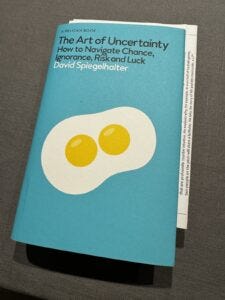Before the Fall
Seen on a woodland walk yesterday.
Quote of the Day
”Music itself is going to become like running water or electricity. So it’s like, just take advantage of these last few years because none of this is ever going to happen again. You’d better be prepared for doing a lot of touring because that’s really the only unique situation that’s going to be left. It’s terribly exciting. But on the other hand it doesn’t matter if you think it’s exciting or not; it’s what’s going to happen.”
David Bowie, speaking to the New York Times — in 2002!.
Amazingly perceptive. Apple’s iPod was just a year old and we were all carrying our music around with us, rather as Victorian tourists in India carried bottles of boiled water. And now we just turn on the tap marked ‘Spotify’.
Musical alternative to the morning’s radio news
Mozart | Piano Sonata No. 12 in F Major, K. 332: II. Adagio | Seong-Jin Cho
Long Read of the Day
You may think that; I couldn’t possibly comment
Lovely blog post by Charles Arthur (Whom God Preserve) on the vexed topic of the comments that appear under many articles published online.
When you arrive at the bottom of a story on a news site, you will—especially if the story appears in the “Opinion” section—often find yourself effectively being invited to comment on what you’ve just read. Come on, you’re not just a reader now: you’re also one of the people with the power to make your voice heard! At last you can stick it to The Man!
So what’s your reaction when you find that 1,500 people have already commented on the article?
So when you see that number, do you think: wa-hey! This must have some fun going on, it’s time that people heard my view on this too.
Or do you think: there cannot possibly be any value in being the 1,501st comment below this story.
My guess is that you fall into the latter category. And yet there are plenty of people out there who do not. They see an article with 200 comments—arguably more than even a quite devoted reader who reaches that point is going to bother with—and think to themselves what this really needs is my opinion, because that’s what people have been missing in all this.
Read on.
Speaking personally…. I’ve always been opposed to comment streams that are not moderated — and many (most?) are not because moderation costs money. What unmoderated commenting reveals is that most people haven’t the faintest idea of how to formulate an argument.
Years ago I had an interesting conversation with a well-known journalist who had recently taken up photography and was delightedly posting his work on Flickr — and also following other photographers on the platform. He particularly liked the pictures of one of his followees and one day wrote to him complimenting him on an image but suggesting that it might have been even more effective if it had been cropped in a certain way.
And the response? “Go f**k yourself.”
Constructive criticism is an art not widely understood..
Books, etc.
David Spiegelhalter (Boris Johnson’s least favourite statistician) has a new book coming in September. Hooray!
AI cheating, the education system and common sense
Yesterday’s Observer column:
LLMs are a burning issue for the humanities in particular because the essay is such a key pedagogical tool for teaching students how to research, think and write. More importantly, perhaps, the essay also plays a central role in how they are graded and assessed. The bad news is that LLMs threaten to make that venerable pedagogy untenable. And that there’s no technical fix in sight.
The good news is that the problem isn’t insoluble – if educators in these disciplines are willing to rethink and adapt their teaching to the new reality. Other pedagogies are available. But they require, if not a change of heart, two changes of mindset.
The first is an acceptance that LLMs – as the distinguished Berkeley psychologist Alison Gopnik puts it – are “cultural technologies”, like writing, print, libraries and internet search. In other words, they are tools for human augmentation, not replacement.
Second, and more importantly perhaps, is a need to reinforce in students’ minds the importance of writing as a process…
My commonplace booklet
On the language of LLMs
Rob Nelson has a marvellous essay on his Substack
At its core, the debate over how to treat LLMs is about the relationship between computation and cognition. Enthusiasts don’t see a problem with using the concepts of human cognition to describe the behavior of LLMs. For skeptics, human thought is vastly more complex than the computational processes happening in even the largest models, and because LLMs do not understand context, they do not know anything. Using words like think, write, or speak to describe what LLMs do is a category error. As Edsger Dijkstra analogized, asking if a machine can think is as relevant as asking if submarines can swim.
The essay is particularly good on the confusions that arise when machine-learning researchers use terms like ‘attention’ in a very specialised way — as a word to describe the information processing that occurs in a transformer-based LLM, but which is totally unlike how we use the term in ordinary human-to-human discourse. Just to underline the problem, the seminal 2017 research paper in which Google researchers announced the conceptual breakthrough represented by the ‘transformer’ model had the provocative title “Attention Is All You Need”.
Feedback
My comments on how the Breugel painting in last Wednesday’s edition highlighted the ways agriculture has changed over the centuries reminded Joe Dunne of another painting — John Constable’s ‘The Cornfield’.
(For a zoomable version click here)
Joe thinks that in the painting Constable was criticising the impact of the Industrial Revolution on farming. Young people were moving to the cities to work in factories where they could get better and stable wages. And he lists evidence in the painting supporting this conjecture. For example:
There are only three workers in the field compared to 20 in Breugel’s 1565 ‘The Harvesters’.
The gate is hanging off its hinges – nobody to fix it (the donkeys & sheep have access to the wheat field so it’s vulnerable to damage).
The farmer inside the gate of the wheat field is quite old (stooped) indicating the youth have left for the city.
The plough is still out in the open and therefore rusting even though it’s now August (corn is ripe) and the ploughing was done in March. No staff to look after it properly.
The tree on the left of the painting is dead – no staff to render the lane safe by cutting it down.
The young boy in the foreground is looking after the sheep – no mature adult available to do this job.






